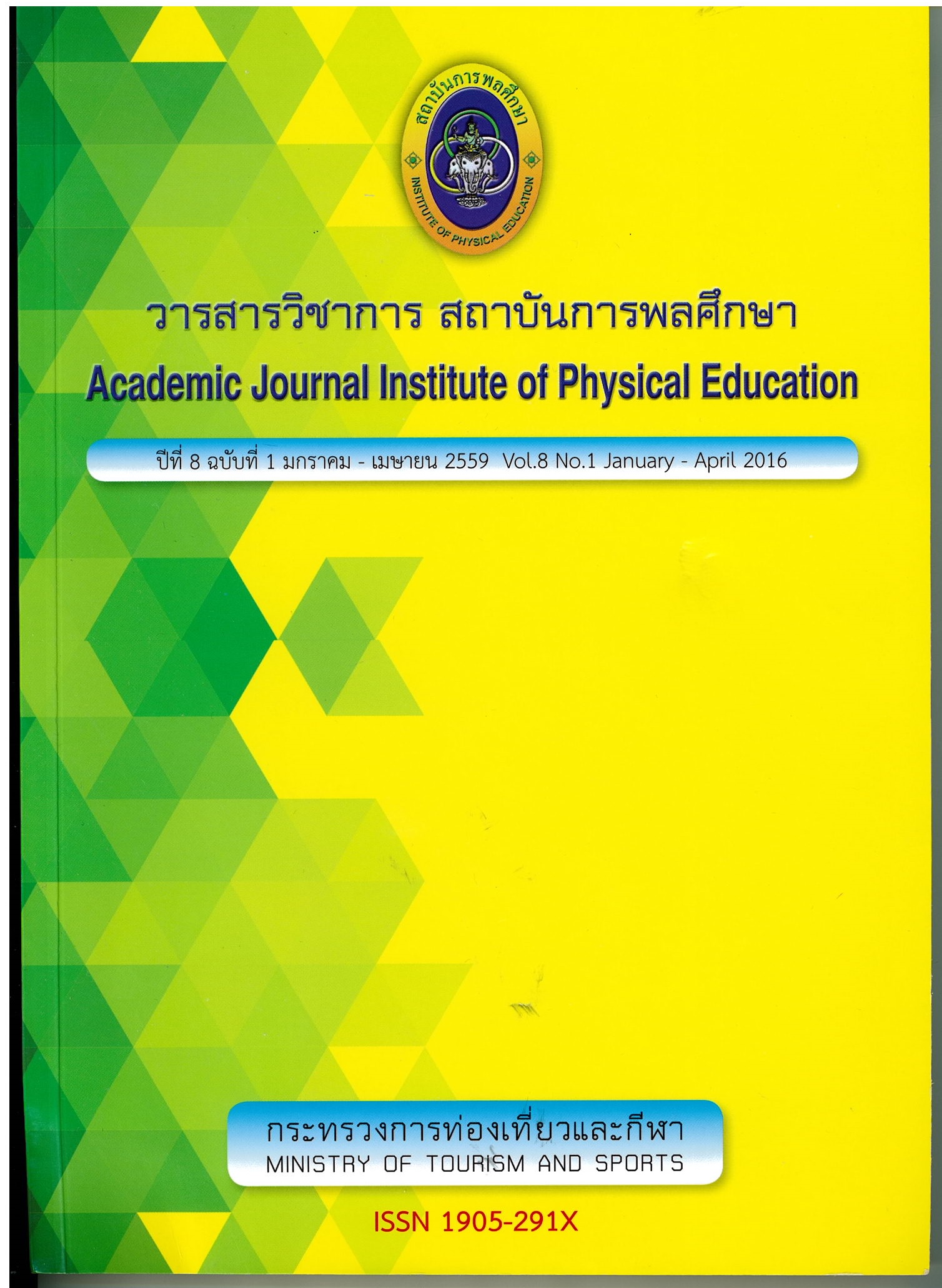The development model in research conduction competency for faculty of Physical Education Institute in the north
Main Article Content
Abstract
This research is for educational research and development and has the objectives (1) to develop a model for developing personnel's competency in the Physical Education Institutes in the North, and (2) to study the effectiveness of the model for developing personnel's competency for conducting research in the Physical Education Institutes in the North. The study population are some experts, administrators, and faculty of Physical Education Institutes in the North. The data is collection by study documents, explore and experiment. The statistics used for data analysis are the percentage, means, standard deviations and the T-test statistics.
The research found that . First, the researcher develops the model for developing the competency on research conduction of the faculty of Physical Education Institutes in the North which composed of three components. These are the component on input, component on process, and component on driven mechanics. Second, from the tests on the effectiveness of the model, the findings reveal that the faculty of Physical Education Institutes in the North reach scores on knowledge and attitude toward research conduction higher on the post-test treatment (after the training) than those before the training. They also have the levels of skill on research conduction higher than the identified criteria.
Article Details

This work is licensed under a Creative Commons Attribution-NonCommercial-NoDerivatives 4.0 International License.
The published article is a copyright of the Academic Journal of Thailand National Sports University. The passage appeared in each article in this academic journal is a perspective of each author which is not related to the journal. Each author is required to be responsible for all components of his/her own article. If there are any mistakes, each author must be responsible for those mistakes on his/her own.
References
ชูชัย สมิทธิไกร. (2556). การฝึกอบรมบุคลากรในองค์การ. พิมพ์ครั้งที่ 8. กรุงเทพฯ : โรงพิมพ์แห่งจุฬาลงกรณ์มหาวิทยาลัย.
ประเวศ วะสี. (2552). ปฏิรูปประเทศไทย ปฏิรูประบบอุดมศึกษา อุดมศึกษาคือหัวรถจักรทางปัญญาพาชาติออกจากวิกฤต. กรุงเทพฯ: ที่คิวพี.
พระราชบัญญัติสถาบันการพลศึกษา พ.ศ. 2548. (2548). ราชกิจจานุเบกษา เล่มที่ 122. กรุงเทพฯ: โรงพิมพ์การศาสนา.
พระราชบัญญัติระเบียบข้าราชการพลเรือนในสถาบันอุดมศึกษา พ.ศ. 2547. (2547), ราชกิจจานุเบกษาเล่มที่ 121. กรุงเทพฯ: โรงพิมพ์การศาสนา.
เพ็ชรี รูปะวิเชตร์. (2554). เทคนิคการจัดฝึกอบรมและการประชุม. กรุงเทพฯ: ดวงกมลพับลิสซิ่ง.
วรภัทร์ ภู่เจริญ. (2549). การบริหารวิถีพุทธ ตอน: การบริหารคุณภาพแบบองค์รวม. กรุงเทพฯ อารยชน.
สถาบันการพลศึกษา. (2556). รายงานการประเมินตนเอง ปีการศึกษา 2556. กรุงเทพฯ : สถาบันการพลศึกษา.
สํานักงานรับรองมาตรฐานและประเมินคุณภาพการศึกษา. (2554). ผลการประเมินคุณภาพภายนอกระดับอุดมศึกษา. [ออนไลน์]. แหล่งที่มา: http://www.onesqa.or.th/onesqa/th/Report/unversity, php 20 มีนาคม 2554
สํานักงานรับรองมาตรฐานและประเมินคุณภาพการศึกษา.. (2556). รายงานผลการประเมินคุณภาพการศึกษา. [ออนไลน์]. แหล่งที่มา: http://www.
onesqa.or.th/onesqa/th/home/index.php 16 สิงหาคม 2557
ศึกษาธิการ. (2545). พระราชบัญญัติการศึกษาแห่งชาติ พุทธศักราช 2542 แก้ไขเพิ่มเติม (ฉบับที่ 2) พุทธศักราช 2545. กรุงเทพมหานคร : สํานักงานคณะกรรมการการศึกษาแห่งชาติ.
สํานักงานเลขาธิการสภาการศึกษา. (2554). ข้อเสนอการปฏิรูปการศึกษาในทศวรรษที่สอง (พ.ศ. 2552 - 2561). กรุงเทพฯ: พริกหวานกราฟฟิค.
สํานักงานเลขาธิการสภาการศึกษา. (2552). กรอบทิศทางการพัฒนาการศึกษา ในช่วงแผนพัฒนาเศรษฐกิจและสังคมแห่งชาติฉบับที่ 10 (พ.ศ. 2550-2554) ที่สอดคล้องกับแผนการศึกษาแห่งชาติ (พ.ศ.2545-2559) ฉบับสรุป, กรุงเทพฯ : โรงพิมพ์แห่งจุฬาลงกรณ์มหาวิทยาลัย.
สมคิด บางโม. (2554). เทคนิคการฝึกอบรมและการประชุม. พิมพ์ครั้งที่ 4. กรุงเทพฯ: พิมพ์ดีการพิมพ์.
สมศักดิ์ ภู่วิภาดาวรรธน์ และคณะ. (2556). การพัฒนาครูและผู้บริหารสถานศึกษาแบบใช้โรงเรียนเป็นฐานในโรงเรียนขนาดเล็ก ระยะที่ 2 : จังหวัดเชียงใหม่และจังหวัดเชียงราย, กรุงเทพฯ: พริกหวานกราฟฟิค.
สุรางค์ โค้วตระกูล. (2552) จิตวิทยาการศึกษา, พิมพ์ครั้งที่ 8. กรุงเทพฯ: จุฬาลงกรณ์มหาวิทยาลัย.
อนิวัช แก้วจํานง. (2554). การจัดการทรัพยากรมนุษย์, พิมพ์ครั้งที่ 2. สงขลา: ศูนย์หนังสือมหาวิทยาลัยทักษิณ.
อมรวิชช์ นาครทรรพ และจุฬาภรณ์ มาเถียรวงศ์. (2005), เมื่อความทุกข์ไล่ล่าเด็ก : ข้อเท็จจริงงานวิจัยภาคสนาม กับคําถามที่ท้าทายในการเสริมสร้างสุขสภาวะไทย. กรุงเทพฯ: โรงพิมพ์จุฬาลงกรณ์มหาวิทยาลัย.
Dessler, Gary. (2005). Human Resource Management. 10th ed., Upper Saddle River, N.J. : Pearson/Education International.
Duttweiler, MW. And Grogan S. (1998). An Action - Research Approach to Evaluation Capacity Building. Illinois: American Evaluation Association Evaluation.
Johnson, R.B. (1998). Toward a Theoretical Model of Evaluation Utilization. Evaluation and Program Plaining, 93-110.
Laird, D. (1985). Approach to Training and Development. (2nd ed.). Reading. MA: Addison Wesley.
Stockdill, S. H., M. Baizerman, D.W. and Compton, D.W. (2002). Toward a Definition of the ECB Process: A Conversation with the ECB Literature. New Directions in Evaluation, 93: 1-25.
Swanson, R. & Holton, E. (2009). Foundation of Human Resource Development. San Francisco: Berrett-Koehler Publisher.
Tosi, H.L, Rizzo, J.R. and Carroll, S.J. (1986). Managing Organizational Behavior. New York: Pitman Publishing Inc.


